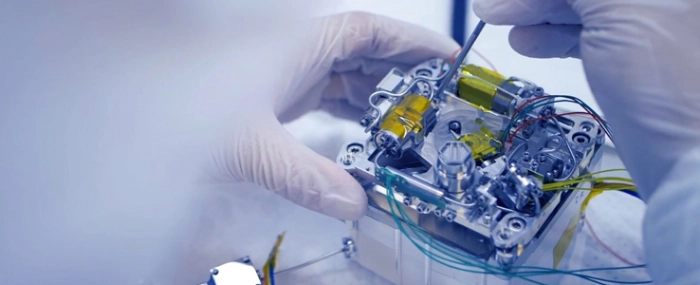
© NanoAvionics
Electronics Production |
Nanosatellite maker to open new factory in the UK
Just some 80 km outside of central London, a nanosatellite bus manufacturer and mission integrator is expanding its space sector business; with high flying plans of job creation.
The company, NanoAvionics, is moving to a new, larger facility for satellite assembly, integration and testing (AIT) as well as sales, technical support and R&D activities located in Basingstoke later this year.
NanoAvionics is a fairly young company, founded just six years ago as a spin-off from Vilnius University, Lithuania back in 2014. But in those six years the company has already managed to develop a hub in Lithuania and two in the USA. This latest move – which is entirely financed by the company itself – is a first step for its UK growth plans. The plans will see the creation of jobs in the space sector and a local technology cluster with a dedicated supply chain of companies in the UK.
The company states in a press release that the new facility will allow NanoAvionics to keep thriving and provide nanosatellite AIT services to its growing and existing customer base in the UK. Customers in the UK include IoT connectivity provider Lacuna Space and Sen, a space company developing its “EarthTV” constellation to stream real-time and timely Ultra-High Definition (UHD) videos of Earth.
“Following the establishment of our first office at Harwell Campus last year, NanoAvionics is now further expanding its business in the UK by investing in this new AIT facility, creating jobs and by developing a technology cluster and supply chain, similarly to what we have done in Lithuania and the USA,” said Vytenis J. Buzas, CEO of NanoAvionics, in the press release.
The CEO further explains his approach to establishing a dedicated supply chain saying that; “To grow our Satellite production capabilities locally, we are going to connect with companies in Britain such as printed circuit board suppliers, electronics manufacturers, cable assembly providers, producers of mechanical components and surface treatment providers.”
As a result of its ongoing geographical expansion and strong contract volume, NanoAvionics has seen a significant revenue increase by about 300% during the last 12 months in August this year. This is mainly explained by the modular design and low cost of their preconfigured nanosatellite buses, which has led to a number space missions with the likes of NASA, ESA and MIT as well as private companies such as Thales Alenia Space for the Omnispace constellation and Accion Systems to test their propulsion technology.
Heading the company’s operations in the UK is Robin Sampson, business development manager for NanoAvionics UK and Western Europe.
“The ambition which the UK has shown in competing within the global space industry resonates with NanoAvionics and brought us to the UK in the first place. One of the reasons that we’ve doubled-down on our investment in the UK, is that we see the potential to conduct world-class industrial research and development here,” Sampson says in the press release.
Basingstoke is described as a great location for the company due to its quick connection to other important locations in the UK.
“And Belvedere House, in the town centre of Basingstoke, offered NanoAvionics a suitable space to install a cleanroom and all the necessary equipment for our nanosatellite production, with an opportunity to scale,” Sampson concluded.
The company specified the Telegraph that the assembly and testing site will provide the company with 250 square metres of space. Robin Sampson told the paper that one of the major challenges was to grow its UK arm to 100 people from 10 within a year, but that Basingstoke was the place where one could make that happen.
This workforce would allow NanoAvionics to initially build between 20 and 30 satellites per year, but it could grow well beyond that.
“We could see ourselves going beyond that 100 people mark, and ultimately we’re probably talking about a maximum potential of between 300 and 400 people to deliver on these bigger nanosatellite constellations,” the UK head told the Telegraph.
The official opening of NanoAvionics’ new facility will take place on 19 November 2020.

